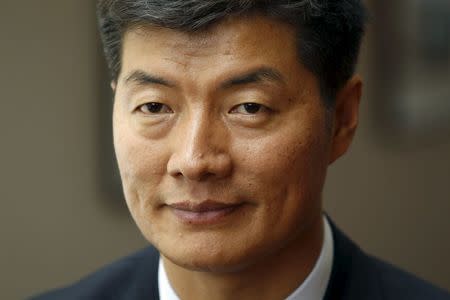Exiled Tibetans re-elect leader who vows to revive autonomy push
By Tommy Wilkes and Abhishek Madhukar DHARAMSALA, India (Reuters) - The political leader of Tibetans in exile, Lobsang Sangay, vowed after being re-elected on Wednesday to convince the international community to renew its interest in his people's plight and back his campaign for China to grant Tibet autonomy. Sangay, who has led the 150,000-odd Tibetan worldwide diaspora since religious leader the Dalai Lama gave up political power in 2011, won 57 percent of nearly 60,000 votes cast, Tibetan officials said in the Indian hill town of Dharamsala. Speaking to Reuters after the election results were announced, Sangay said Tibet's struggle for autonomy was "not talked about as much" as a few years ago in Western countries now preoccupied with a raging war in Syria and a refugee crisis in Europe. "With the economic growth of China, they (Chinese leaders) have become politically and diplomatically more powerful," he told Reuters at his office overlooking the Himalayas in Dharamsala, where the Central Tibetan Administration (CTA) is based. No country recognises the body, and China has declined to talk to it. "Human rights are secondary to investment (in the West). I will be travelling more to promote awareness about Tibet," he said, seated below a framed photo of the Dalai Lama and an image of Sangay superimposed below him. Sangay said the picture was made and framed in Tibet, and then smuggled to him. Beijing's growing economic might has slowly pushed the Tibetan cause out of the international limelight. The Dalai Lama has been denied audiences with several world leaders in recent years, including the Pope. The Dalai Lama, 81, has sought to build a democratic system of government for exiled Tibetans strong enough to hold the community together and negotiate with China after his death. Competing assertions over who will succeed the Dalai Lama once he dies have reinforced the need for a leader with democratic legitimacy. NO SIGN OF CHINA SOFTENING Sangay, who will head the CTA for a second five-year term, triumphed after a campaign that was marked by bitter rivalry between the candidates, which earned rare rebukes from the Dalai Lama who refused to meet with the main contenders while the mudslinging went on. "I voted for him (Sangay) because of his educated background," said Choezin, a 53-year-old crimson-robed monk who fled Tibet in 1985 to settle in Dharamsala, the exiled government's base. "His Holiness wants somebody who can continue the work he has done. He has said Sangay is the right man." Sangay, like the Dalai Lama and most Tibetans, backs the so-called middle way that seeks autonomy within China. But in his first term he made no headway convincing the Chinese to talk. On Wednesday, Sangay said he saw "no new signals" from the Chinese that they would soften their approach to Tibet. Formal negotiations between China and the Dalai Lama's representatives broke down in 2010, and the stalemate since has cast a pall over Tibetans in exile. China describes the incorporation of Tibet into its territory in 1951 as a "peaceful liberation", and says it has brought development to what was a backward region. Exile groups say they seek genuine autonomy for Tibet, rather than independence. China says Tibet already has genuine autonomy, and that exile groups seek to split the country. Tibetans accuse China of eroding their deeply Buddhist culture and flooding the region with ethnic Han Chinese. Tibetan Buddhism holds that the soul of a senior lama is reincarnated in the body of a child after he dies. China says it must sign off on the reincarnation of the Dalai Lama, who fled to India in 1959 after a failed uprising. (Additional reporting by Ben Blanchard; Editing by Douglas Busvine and Raissa Kasolowsky)



